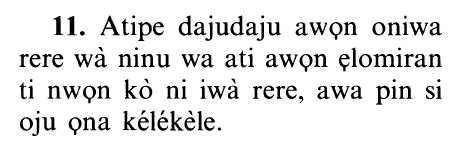72vs11
Select any filter and click on Go! to see results
وَأَنَّا مِنَّا الصَّالِحُونَ وَمِنَّا دُونَ ذَلِكَ كُنَّا طَرَائِقَ قِدَداً
Waanna minna alssalihoona waminna doona thalika kunna taraiqa qidadan
Index Terms
Click to play
Yoruba Translation

Hausa Translation
"Kuma lalle ne mũ, akwai sãlaihai a cikinmu, kuma akwai a cikinmu waɗanda ba haka bã mun kasance ƙungiyõyi dabam-dabam."
Asbabu n-Nuzuul (Occasions of Revelation)
The Jinns testify that among Them there are Believers, Disbelievers, Misguided and Guided
Allah says that the Jinns said about themselves,
وَأَنَّا مِنَّا الصَّالِحُونَ وَمِنَّا دُونَ ذَلِكَ ...
There are among us some that are righteous, and some the contrary;
meaning, other than that.
... كُنَّا طَرَائِقَ قِدَدًا ﴿١١﴾
We are groups having different ways.
meaning, on numerous differing paths and having different thoughts and opinions.
Ibn `Abbas, Mujahid and others have said,كُنَّا طَرَائِقَ قِدَدًا (We are groups having different ways).
"This means among us are believers and among us are disbelievers.''
Ahmad bin Sulayman An-Najjad reported in his (book of) Amali that he heard Al-A`mash saying,
"A Jinn came to us, so I said to him, `What is the most beloved food to your kind'
He replied, `Rice.'
So we brought them some rice and I saw the morsels being lifted but I did not see a hand lifting it. So I asked him, `Do you have these desires (religious innovations) among your kind as we have among ours'
He replied, `Yes.'
Then I said, `Who are the Rafidah among you'
He said, `They are the worst of us.'''
I presented this chain of narration to our Shaykh, Al-Hafiz Abi Al-Hajjaj Al-Mizzi and he said its chain is authentic to Al-A`mash.
يقول تعالى مخبرا عن الجن أنهم قالوا مخبرين عن أنفسهم " وأنا منا الصالحون ومنا دون ذلك " أي غير ذلك " كنا طرائق قددا " أي طرائق متعددة مختلفة وآراء متفرقة قال ابن عباس ومجاهد وغير واحد " كنا طرائق قددا " أي منا المؤمن ومنا الكافر وقال أحمد بن سليمان النجاد في أماليه حدثنا الحسن بن أسلم بن سهل بحشل حدثنا علي بن سليمان هو أبو الشعثاء الحضرمي شيخ مسلم حدثنا أبو معاوية قال سمعت الأعمش يقول تروح إلينا جني فقلت له ما أحب الطعام إليكم ؟ فقال الأرز قال فأتيناهم به فجعلت أرى اللقم ترفع ولا أرى أحدا فقلت فيكم من هذه الأهواء التي فينا ؟ قال نعم فقلت فما الرافضة فيكم ؟ قال شرنا. عرضت هذا الإسناد على شيخنا الحافظ أبي الحجاج المزي فقال هذا إسناد صحيح إلى الأعمش . ذكر الحافظ ابن عساكر في ترجمة العباس بن أحمد الدمشقي قال سمعت بعض الجن وأنا في منزل لي بالليل ينشد : قلوب براها الحب حتى تعلقت مذاهبها في كل غرب وشارق تهيم بحب الله والله ربها معلقة بالله دون الخلائق .
"وأنا منا الصالحون" بعد استماع القرآن "ومنا دون ذلك" أي قوم غير صالحين "كنا طرائق قددا" فرقا مختلفين مسلمين وكافرين
" وأنا منا الصالحون ومنا دون ذلك " هذا من قول الجن , أي قال بعضهم لبعض لما دعوا أصحابهم إلى الإيمان بمحمد صلى الله عليه وسلم , وإنا كنا قبل استماع القرآن منا الصالحون ومنا الكافرون . وقيل : " ومنا دون ذلك " أي ومن دون الصالحين في الصلاح , وهو أشبه من حمله على الإيمان والشرك .
I'raab - grammatical analysis of the Qur'an
«وَأَنَّا» أن واسمها «مِنَّا» خبر مقدم «الصَّالِحُونَ» مبتدأ مؤخر والجملة الاسمية خبر أنا وجملة أنا معطوفة على ما قبلها «وَمِنَّا» خبر مقدم «دُونَ» ظرف متعلق بمبتدأ مؤخر حسب ابن هشام في الشذور «ذلِكَ» مضاف إليه والجملة الاسمية معطوفة على ما قبلها «كُنَّا» كان واسمها «طَرائِقَ» خبرها «قِدَداً» صفة طرائق والجملة حال.
